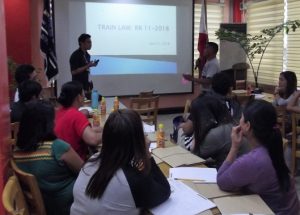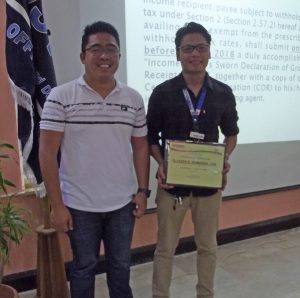BUTUAN CITY – With the intensified efforts of the government to improve the level of well-being of its constituents, the administration drafted Republic Act 10963 otherwise known as TRAIN Law or Tax Reform for Acceleration and Inclusion Law pursuant to the provisions of Section 244 of the National Internal Revenue Code published on March 15, 2018. This law aims to incentivize the people by throwing off the old tax scheme and impose a more improved one.
 Addressing the challenge on educating and translating the salient features of the TRAIN LAW to beneficiaries of Micro-Small and Medium Enterprise (MSME), the Department of Social Welfare and Development (DSWD), through the Kapit-Bisig Laban sa Kahirapan – Comprehensive and Integrated Delivery of Social Services’ (Kalahi-CIDSS) – Livelihood and Enterprise (L&E) modality, conducted an orientation on the matter last April 6, 2018 at the DSWD Caraga Conference Hall. In attendance were the beneficiaries, together with representatives of the Regional Program Management Office (RPMO) and Area Coordinating Teams (ACT). Revenue Officer, Mr. Ellezer E. Dumaran, served as the resource speaker for the activity.  Dumaran discussed changes on the Personal Income Tax (PIT) and some impacts the TRAIN Law can make in their enterprises highlighting the use of correct books in accounting and the timely payment of taxes. One of the goals of the TRAIN Law is to lower the PIT. Through this, small-scale entrepreneurs can now have a bigger profit, thereby improving the well-being of individuals and households, which would then lead to the decrease of poverty. An open forum was also initiated which paved way for participants to raise questions regarding TRAIN Law, and be given explanations with regards to their queries. The L and E is one of the new modalities being implemented by the DSWD Kalahi-CIDSS Program. Through the utilization of Community-Driven Development, communities who have identified livelihood needs and have existing resources are extended funds and capability building activities to ensure a more active planning, budgeting and implementing of a community livelihood program. ###(RUSS CLEPPIN M. PASTER/ MARKO DAVEY D. REYES/Social Marketing Unit/DSWD Field Office Caraga) |

